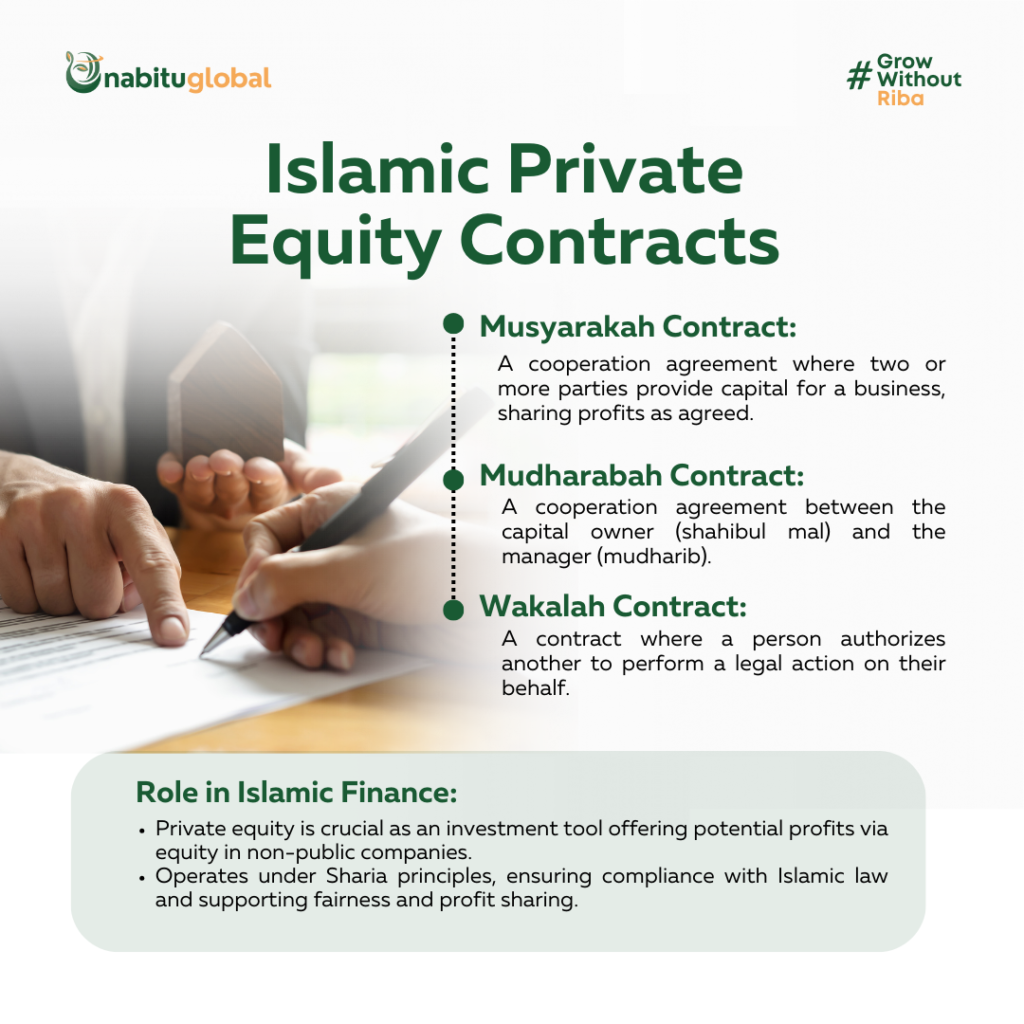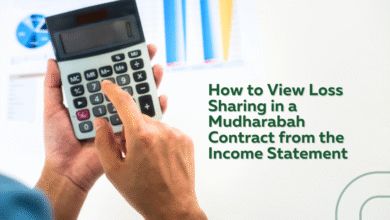Islamic Private Equity: What Contracts Are Used?
Islamic private equity operates under the principles of sharia in every transaction, including in the selection of the contracts used. These contracts not only ensure compliance with Islamic law and fulfil different financing needs, but also support the principles of fairness and profit sharing in the transaction. In Islamic finance, private equity plays an important role as an investment instrument that offers potential profits through equity participation in companies that have not gone public.
The Contracts Used Between Investors and Private Equity:
In carrying out its business activities to raise funds from investors to be channeled to businesses that apply for financing, private equity itself can use several Islamic contracts, including:
Musyarakah Contract
MA musyarakahcontract is a cooperation agreement between two or more parties to include capital in a business with mutually agreed-upon profit sharing. In the context of the contract between investors and private equity, investors deposit their funds with private equity as a union, where private equity channels the combined investment funds between investors and their own funds to businesses financed by the private equity.
The profits from the financing of these businesses are shared by a percentage of the profits between the investor the private equity. However, there is also another interpretation of the musyarakah contract in private equity where several investors invest in a pool of funds managed by private equity with profits shared based on the amount of investment of each investor.
The DSN MUI fatwa that regulates the musyarakah contract itself is as follows:
- DSN MUI Fatwa No. 08/DSN-MUI/IV/2000 regarding Musyarakah Financing
- DSN MUI Fatwa No. 114/DSN-MUI/IX/2017 regarding Shirkah Akad
Mudharabah agreement is a cooperation agreement between the capital owner (shahibul mal) and the capital manager (mudharib) in which the capital manager is responsible for managing the capital for a certain business and the profit is divided according to the agreed ratio. In Islamic private equity, this contract is often used because it allows investors to invest without having to be directly involved in the management of the business by handing over their funds to private equity as mudharib with profit sharing agreed upon in the investment contract.
The DSN MUI fatwa that regulates the mudharabah contract itself is as follows:
- DSN MUI Fatwa No. 115/DSN-MUI/IX/2017 on Mudharabah Agreement
- DSN MUI Fatwa No. 50/DSN-MUI/III/2006 on Mudharabah Musytarakah Akad
- DSN MUI Fatwa No. 07/DSN-MUI/IV/2000 regarding Mudharabah Financing (Qiradh)
Wakalah Contract
A wakalah contract is a contract in which a person authorises another person to perform a legal action on his behalf. In Islamic private equity, a wakalah contract can be used when an investor gives a mandate to a fund manager to invest his capital. In this kind of wakalah contract, the private equity firm usually asks for a percentage of the profit or from the investment fund as a fee for carrying out the investment for the benefit of the investor.
Some of the DSN MUI fatwas that regulate wakalah contracts are:
- DSN MUI Fatwa No. 126/DSN-MUI/VII/2019 regarding Wakalah bi al-Istitsmar Akad
- DSN MUI Fatwa No. 113/DSN-MUI/IX/2017 regarding Wakalah bi Al-Ujrah Akad
- DSN MUI Fatwa No. 10/DSN-MUI/IV/2000 regarding Wakalah

In the first part of this article, we have explained the contracts that can be used by Islamic private equity in raising funds from investors, so in the second part of the discussion, we will explain the contracts used between private equity and the businesses that receive financing from them. May Allah ta’ala make access to Islamic financing easier for Muslim businesses.
Wallahu a’lam
Referensi
- Fatwa DSN MUI No. 08/DSN-MUI/IV/2000 mengenai Pembiayaan Musyarakah
- Fatwa DSN MUI No. 114/DSN-MUI/IX/2017 mengenai Akad Syirkah
- Fatwa DSN MUI No. 115/DSN-MUI/IX/2017 mengenai Akad Mudharabah
- Fatwa DSN MUI No. 50/DSN-MUI/III/2006 mengenai Akad Mudharabah Musytarakah
- Fatwa DSN MUI No. 07/DSN-MUI/IV/2000 mengenai Pembiayaan Mudharabah (Qiradh)
- Fatwa DSN MUI no 126/DSN-MUI/VII/2019 mengenai Akad Wakalah bi al-Istitsmar
- Fatwa DSN MUI no 113/DSN-MUI/IX/2017 mengenai Akad Wakalah bi Al-Ujrah
- Fatwa DSN MUI no 10/DSN-MUI/IV/2000 mengenai Wakalah







